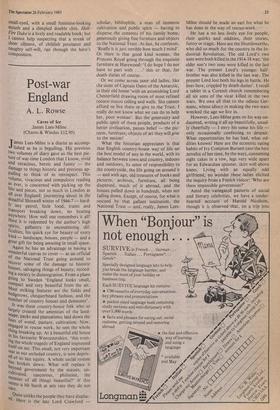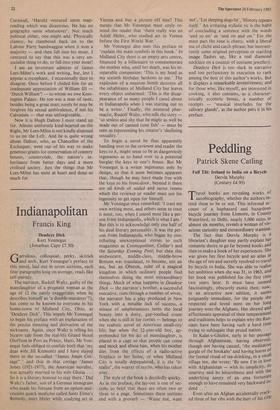Post-war England
A. L. Rowse
Caves of ice James Lees-Milne (Chatto & Windus £12.95)
James Lees-Milne is a diarist as accomp- lished as he is beguiling. His previous two volumes of diary gave us the best pic- ture of war-time London that I know, vivid and veracious, heroic and funny — the damage to things historic and precious ap- palling to think of in retrospect. This volume, vivacious and compulsive reading as ever, is concerned with picking up the bits and pieces, not so much in London as all over England; journeying about in the dreadful Shinwell winter of 1946-7 — hard- IY any petrol, little food, trains and transport breaking down, no heating anywhere. How well one remembers it all! Here it is redeemed by the author's high spirits, gallantry in encountering dif- ficulties, his quick eye for beauty of every kind — landscape, houses, people — and a great gift for being amusing in small space.
Again he has an advantage in having a wonderful canvas to cover — as an official of the National Trust going around to recover some of the damage to historic houses, salvaging, things of beauty, record- ing a society in disintegration. From a plane going to Sweden 'England looks small, compact and very beautiful from the air. Most striking features arc the fields and hedgerows, chequerboard fashion, and the number of country houses and demesnes'. It was these country-house folk who so largely created the amenities of the land- scape, parks and plantations; laid down the "es of wood, pasture, cultivation. Now, engaged in rescue work, he sees the whole !king breaking up. At a beautiful old house in his favourite Worcestershire, 'this even- Mg the whole tragedy of England impressed itself on me. This small, not very important seat in our secluded country, is now depriv- !_d of its last squire. A whole social system has broken down. What will replace it °eYond government by the masses, un- cultivated, rancorous, philistine, the enemies of all things beautiful?' If this seems a bit harsh at any rate they do not care.
Quite unlike the people they have displac- e& Here is the late Lord Crawford —
scholar, bibliophile, a man of immense cultivation and public spirit — having to disperse the contents of his family home, generously giving fine furniture and objects to the National Trust. At last, he confesses, 'Really it is just terrible how much I mind'. Or there is that good kind woman, the Princess Royal going through the exquisite furniture at Harewood: 'I do hope I do not have to part with . . .' this or that, for death duties of course.
Or we come across poor old ladies, like the sister of Captain Oates of the Antarctic, in their old home 'with an astonishing Lord Chesterfield drawing room of most refined rococo stucco ceiling and walls. She cannot afford to live there or give to the Trust. I really do not know what we can do to help her, poor woman'. But the generosity and public spirit of these people, products of a better civilisation, passes belief — the pic- tures, furniture, objects of art they will give to the nation!
What the historian appreciates is that that English country-house way of life set the best model of any in the world, with its balance between town and country, indoors and outdoors, its sense of responsibility to the countryside, the life going on around it — and with age, old treasures of books and pictures, archives, furniture, all being dispersed, much of it abroad, and the houses pulled down in hundreds, when not falling down. Except, of course, for what is rescued by that gallant institution, the National Trust — and, really, James Lees- Milne should be made an earl for what he has done in the way of rescue-work.
He has a no less lively eye for people, their quirks and oddities, their stories, funny or tragic. Here are the Shuttleworths, who did so much for the country in the In- dustrial Revolution. The old Lord's two sons were both killed in the 1914-18 war; 'the elder son's two sons were killed in the last war. The present Lord's younger half- brother was also killed in the last war. The present Lord lost both his legs in battle. He lives here, crippled by death duties'. I recall a tablet in a Cornish church remembering all six sons of the vicar killed in the two wars. We owe all that to the odious Ger- mans, whose idiocy in making the two wars wrecked the age we live in.
However, Lees-Milne goes on his way un- daunted, writing it all up beautifully, usual- ly cheerfully — I envy his sense his life only occasionally confessing to despair. What opportunities he has had, what od- dities known! Here are the eccentric eating habits of Ivy Compton Burnett (not the best novelist of her time, by the way), consuming eight cakes in a row, legs very wide apart for an Edwardian spinster, skirt well above knees. Living with an equally odd girlfriend, no yonder these ladies elicited the inquiry from a French visitor: 'Who are these impossible governesses?'
Amid the variegated parterre of social and literary celebrities, we have a tender- hearted account of Harold Nicolson, though it is observed that, on a trip into Cornwall, 'Harold ventured upon map- reading which was disastrous. He has no geography sense whatsoever'. Nor much political either, one might add. Physically clumsy, he clambered back on to the Labour Party bandwaggon when it won a majority — and then fell into his moat. ventured to say that this was a very un- socialist thing to do, to fall into your moat!
I am an inveterate admirer of James Lees-Milne's work and writing, but, lest I appear a sycophant, I occasionally dare to disagree. Once before I chided him for an inadequate appreciation of William III — 'Dutch William'! — to whom we owe Kens- ington Palace. He too was a man of taste, besides being a great man; surely he may be forgiven his sexual ambivalence, if not his Calvinism — that was unforgiveable.
Now it is Hugh Dalton I must stand up for. Almost uniformly kind-hearted on the Right, Mr Lees-Milne is not kindly disposed to us on the Left. And he is quite wrong about Dalton, who, as Chancellor of the Exchequer, went out of his way to make generous grants for conservation of country houses, countryside, the nation's in- heritance from better days and a more civilised society. Just the things that Mr Lees-Milne has most at heart and done so much for.











































 Previous page
Previous page